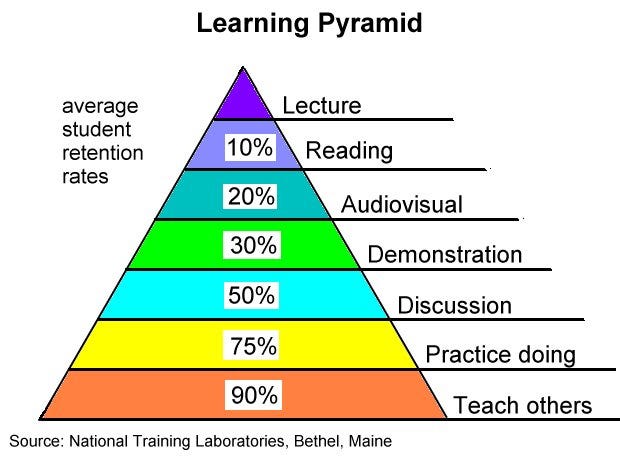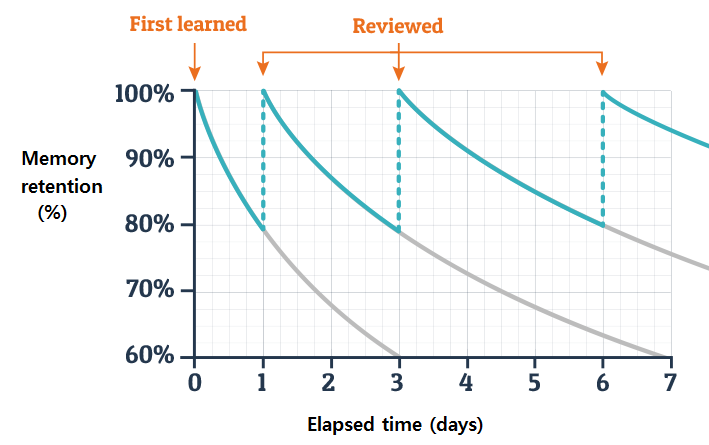7 Strategies To Help You Remember 80% of Everything You Read
Photo by Yiqun Tang on Unsplash
It happens all the time…
You read an amazing book such as Outlive by Peter Attia or Atomic Habits by James Clear. But then when you try to have a conversation about the book with someone, you can’t seem to remember anything about it.
It’s frustrating, right?
Of course, it is! You just spent a whole month reading this book and it turns out that what you thought was an investment in knowledge turned out to be mere entertainment. It feels like you just wasted all that time reading.
And the worst part?
It happens again and again and again.
You start to think that maybe you just have a bad memory. But let me just stop you right there because here’s the thing about memory: Forgetting most of what you read isn’t a character flaw. Instead, it’s the way you read books that’s flawed.
How do I know? I know because I used to feel the same way. I’d read a book, I’d claim it was one of the best books I ever read, and then I’d immediately forget what was in it. It sucked.
However, once I understood how memory works, everything changed for me.
Now…
- I can read a book and easily retain 80% of what was said in it.
- I can explain complex concepts during simple conversations.
- I can recall interesting ideas and include them in my writing.
Finally, I feel like reading is a true investment in my knowledge.
And if I can do it, you can do it too.
So if you want to stop forgetting everything you read, then here are 7 simple strategies that will help you remember at least 80% of everything you read:
1) Stop Allowing Yourself To Be Pulled Away
Have you ever heard of Nelson Dellis? Here’s a picture of him: Source: Nelson Dellis’ Instagram
Source: Nelson Dellis’ Instagram
If you’ve never heard of him, Nelson Dellis is an absolute legend in the memory competitor world.
- He’s memorized 339 digits in five minutes.
- He’s memorized 217 names in fifteen minutes.
- He’s memorized an entire deck of cards in less than 30 seconds.
- He’s even won the USA Memory Championship a bunch of times and ranks very high globally.
So how did he do it? According to Nelson, it starts with the obvious: Pay attention!
Makes sense. I mean, how else are you supposed to remember something you read if you aren’t even paying attention to it in the first place?
That’s right, you’re not. So let me say it again just in case you weren’t paying attention the first time you read it: If you want to remember more of what you read, then you need to pay better attention.
Unfortunately, paying attention is a skill many of us struggle with.
Luckily, there are 2 tricks you can use to set your mind up so that you’re more likely to pay attention while you read:
1) Get rid of any distractions when you read. Put your phone in your pocket, close your laptop, and listen to lyricless music. Don’t try to pay attention half-assed. This means not singing along to music while you’re reading and not checking your phone every 2 minutes. Commit to paying attention to whatever it is you’re reading. It’s not that hard.
2) While you’re reading, constantly ask yourself the following question: “How can I use this in my life?” Asking yourself this question will help keep you focused on looking for those important lines in a book that are going to stick with you long-term.
9 times out of 10, you’ll find that these 2 tips will do the trick.
2) Pretend You’re Watching A Movie
Have you ever read an amazing book, but then afterwards, couldn’t remember anything about it?
If so, then here’s what you should do the next time you’re reading so this never happens to you again:
First, pay attention! Remember the previous idea?
Second, as you read, pretend you’re watching a movie. Essentially, try to visualize what’s happening in your mind. Obviously, you can’t visualize everything you’re reading, but you can envision the general idea of what’s being said.
Personally, when I’m reading a book, I like to imagine what I’m reading is being played out on a big movie theater screen and I’m in the audience sitting down just watching it all happen.
Why does this help? Because it turns out that our brains are far better equipped to remember certain types of information better than others.
According to memory research, visual images are a lot stickier to our brains than abstract stuff like random words. So whatever it is you’re reading, try to visualize it as if it were an actual memory of your own.
Yes, this method won’t guarantee that 100 percent of the details will stick in your brain, but you’ll have a significantly better chance of remembering what you read later on.
3) Handwrite (Don’t Type) Interesting Ideas You’ve Read
As humans, we’re terrible at retaining information. We forget almost all of the things we read about.
However, when we write things down, we’re far more likely to retain it.
This is exactly what Beethoven used to do when he composed music. In the book Managing Oneself, the founder of modern business management Peter Drucker says,
“Beethoven left behind an enormous number of sketchbooks, yet he said he never actually looked at them when he composed. Asked why he kept them, he is reported to have replied, “If I don’t write it down immediately, I forget it right away. If I put it into a sketchbook, I never forget it and I never have to look it up again.”
According to multiple studies, when you handwrite your notes, you retain more information.
Why? Because when you handwrite notes, you’re not going to write down every single word you read. Instead, you’re going to write down only the necessary words. This helps you differentiate between what’s important from what’s not important. This helps you synthesize the information better.
This is why whenever I learn about an interesting idea, I write it down immediately. I write it down so that I can better understand, internalize, and remember it better.
Even if you don’t ever re-read what it is you wrote down, the simple act of writing it down will increase your ability to retain information better.
4) Learn To Fully Interact With The Book
Reading is supposed to be an active process, not a passive one.
Therefore, if you’re reading a book and you’re not fully interacting with the material, then you’re going to naturally forget most of it.
So how do you learn to be an active reader? You can do this in many ways, but here are 4 strategies I highly recommend:
- Underline or highlight important or memorable statements or passages.
- Add symbols such as stars for key lines that are impactful to you or question marks to indicate lines you’re skeptical about or things you want to research further.
- Write down any thoughts or questions you have in the margins of the pages.
- After you read the entire book, go back and put sticky notes on the most important statements or passages in the book.
By doing these 4 things, you’ll be able to take the book off the shelf at any time and, by opening it to any page, refresh your memory of it.
Now, you may be hesitant to do this stuff because the idea of writing in a book scares you. But don’t be. Even if I had a book that was worth $1,000, I’d still do this.
Why? Because what’s important is not the book itself, but the ideas in the book. And it would be a reading sin to not get everything you can out of a book.
5) Apply What You’ve Read
I’m sad to say this, but when it comes to remembering what you read, highlighting and note taking is basically worthless.
Now, you’re probably thinking, “What? Didn’t you just talk about the importance of highlighting and taking notes in the previous section?”
Yes, but let me explain…
Highlighting in itself actually doesn’t help you retain information. The only benefit of highlighting is that it will alert you to what you should look at when you go back and re-read.
Because here’s the thing about human memory: We tend to remember things that we use.
So if you read a book on health, the way you’re going to remember what you read is by changing how you approach your health.
If you read a health book and you highlight a bunch of passages, but you don’t change how you eat, work out, or sleep, then you’re not going to remember anything.
Therefore, if you don’t find ways to implement the ideas you read into your life in some way, then you aren’t going to remember them.
As a result, you’re going to have this constant feeling of like “Wow, I read all these books and I have no idea what’s in them.”
Yeah, because you didn’t do anything actionable afterwards!
6) Teach Someone Else What You’ve Read
Imagine you had a bucket, and every time you tried to fill that bucket with water, 90% of it leaked out.
If this was happening to you, would you keep on filling the bucket or would you fix the leaks?
You’d most likely fix the leaks.
Unfortunately, when it comes to learning, people just keep on filling their bucket and never think about the leaks.
Because of this, almost everybody wastes 90% of their learning simply because they don’t understand what’s known as “The Learning Pyramid.” Essentially, the Learning Pyramid says that you’ll retain 90% of the information you read about if you simply decide to teach it to someone else.
Essentially, the Learning Pyramid says that you’ll retain 90% of the information you read about if you simply decide to teach it to someone else.
Why? Because similarly to handwriting notes you find interesting, when you try to teach something you’ve read, you’re not going to be using the author’s words verbatim. Instead, you’re going to be using your own words. This forces your brain to learn the information better.
So the next time you read an interesting idea, make an effort to share it with someone else. Simply ask a family member or a friend, “Hey real quick, can I share an interesting idea from this book I’m reading?” And for 2–3 minutes, talk about what you just read.
Remember, a concept is never just learned through reading. Reading only has a 10% retention rate. That’s terrible. This is why concepts need to be talked about in order for them to actually be retained.
7) I Can’t Say The Following Enough: Review Review Review
There are some people who can read a book once and retain every single piece of information in that book perfectly. But, for 99% of us, the majority of information we read in a book will be easily forgotten.
This is what’s known as “The Forgetting Curve,” which states: We forget almost every newly acquired piece of information within the first 24 hours.
Exactly how much you forget in the first 24 hours is different for each person.
But here’s the thing…
Unless you review the information you just learned, much of it will slip out of your brain after the first day, with more slipping out in the days after, leaving you with just a fraction of what you originally learned. The Forgetting Curve
The Forgetting Curve
This is interesting because when we read a book, we feel like we’re retaining what we’re reading. The information is flowing in, we’re understanding it, and it’s all piecing together, but it actually doesn’t stick in our heads unless we review what we actually read.
Unfortunately, there’s no way around this. You have to review. But what type of review should you be doing?
It’s called spaced repetition review!
Essentially, you review what you’ve learned at regular intervals after you learn something.
There are many strategies you can use to do this, but the one strategy that I recommend you use is what’s known as “The Rule of 5.”
The Rule of 5 says that after you learn something you want to remember long-term, you should ideally review the piece of information you’re trying to memorize at the following intervals:
- 5 times the first day.
- Once a day for 5 days.
- Once a week for 5 weeks.
Then after that, you’re good to go!
Remember, information only gets reinforced into your long-term memory by reviewing it. So if you don’t regularly review what you’ve learned, then you have a high chance of easily forgetting it.
However, by using The Rule of 5, you can easily retain any piece of information you read in a book for the rest of your life.









































